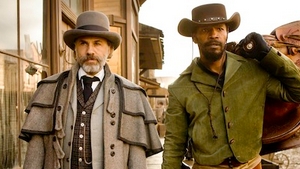 If there’s one filmmaker who marches to the beat of his own drum, it’s Quentin Tarantino. Raised on a healthy cinematic diet of spaghetti westerns, gritty 60’s/70’s cult classics, not to mention pretty much everything in the Australian documentary Not Quite Hollywood and more, he has become one of the film world’s most talented and widely accepted acquired tastes. From Pulp Fiction to Jackie Brown to Kill Bill to his 2009 film Inglourious Basterds, QT has learned so much about how to make film that Django Unchained might just be the pinnacle of his efforts. So how does Tarantino weave that special kind of magic? Simple, outright theft.
If there’s one filmmaker who marches to the beat of his own drum, it’s Quentin Tarantino. Raised on a healthy cinematic diet of spaghetti westerns, gritty 60’s/70’s cult classics, not to mention pretty much everything in the Australian documentary Not Quite Hollywood and more, he has become one of the film world’s most talented and widely accepted acquired tastes. From Pulp Fiction to Jackie Brown to Kill Bill to his 2009 film Inglourious Basterds, QT has learned so much about how to make film that Django Unchained might just be the pinnacle of his efforts. So how does Tarantino weave that special kind of magic? Simple, outright theft.
Now that’s not an accusation or an inflammatory statement. On the contrary, it’s a compliment. Tarantino has learned how to make some damn fine films because he’s had some great teachers: John Ford, Sam Peckinpah, Terence Hill, Sergio Leone, Akira Kurosawa to name a few obvious ones. All have had a hand in crafting young Tarantino and while he may not call any of his films homages to any director in particular, it’s clear to see how he puts them all on pedestals. After studying them for decades he’s learned what works and what doesn’t and used that knowledge to create any of his above mentioned films. There’s that old saying that goes “good artists borrow and great artists steal“, but QT might have committed the crime of the century and all but given us the same film Peckinpah and Leone would have, if they were alive today of course.
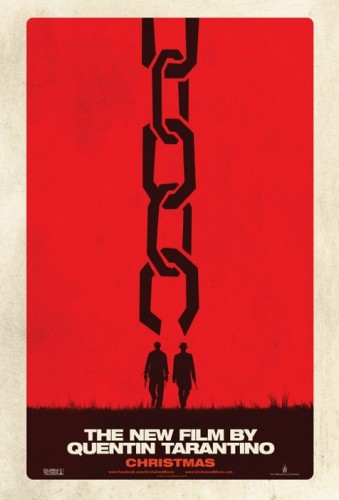
Bounty hunting stories don’t come along all that often and, like movies about gunslingers, are kind of an outdated if not dead film genre. Yet thinking of every film Taratino has made, they’re all heavily saturated in similarly outdated themes and genres. As such he not only gives them sort of a revival but also makes us realize what we, as movie goers, are missing. Further, that there’s more out there than the brainless shoot ’em ups and rom-coms that populate the multiplexes. Sure that’s selling the movie industry short but how often does a QT film come a long? Further how much of a breath of fresh air is it when one shines on theater screens? When QT makes something, his attention to detail and attempts to immerse the audience in the story (and time frame) know no bounds. Starting from frame one, in this case the vintage Columbia logo, you know he next 2+ hours will be a unique and fulfilling experience.
Even though they play in wide release,Tarantino films are made for movie lovers with specific tastes, genre fans to be more specific. Like Jarmusch, Anderson, Lynch or Cronenberg, a QT film plays/caters to a certain kind of audience and while the film may be lost on a larger number of movie goers, those that dig his (and their) work really dig his work. The scenes are comprised with intent, the dialog is always lively, and balanced perfectly between straight-laced and hilarious. Like all QT films the writing speaks for itself, but like 2009’s Basterds it simply sings. It’s razor sharp, but the playful undertone keeps it from feeling pretentious. He also know how to have some fun and doesn’t mind tapping the brakes and allowing the audience to have a big laugh. For instance, like something out of Blazing Saddles (or possibly Tarantino citing yet another influence on his film), there’s a bag/mask scene with the outlaw Posse out to get Foxx and Waltz that can easily be contender for the funniest scene you’ll experience in all of 2012.
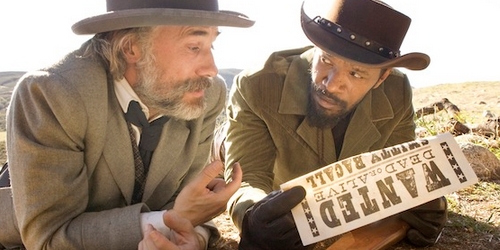
The writing is, as you might suspect, stream-lined and extremely sharp but it’s the incredibly talented eclectic ensemble of actors that make the material dance. Coming off his Oscar-winning turn in Inglourious Basterds, Christoph Waltz is a welcomed returning member of the QT family. As an alum he gets what Tarantino is going for and playing the part Dr. King Schultz he is equally cordial and comical, but sophisticated and dangerous. Another welcomed returner is Sam Jackson who plays DiCaprio’s right hand/opinionated man servant with a hidden agenda. He definitely brightens the mood with humor that is as biting and sarcastic; his over the top performance is perfectly balanced out by DiCaprio’s coiffed but sleazyily intense demeanor. Finally Foxx, taking up the Franco Nero namesake, is plenty capable with the material and is well suited to the role turning in the most modern performance in the period film. His arc is predictable but still lots of fun watching his progression from slave to bounty hunter in order to find/save his wife (and himself).
A fine companion piece to Inglourious Basterds and the masculine counterpart to Kill Bill, Django Unchained shares an equally nonlinear timeline. It’s in that narrative structure that QT has some real fun taking artistic liberties with flashbacks, scene compositions and choreography. But mostly he keeps within the path of seminal films of this ilk finding lots of wide-angle sweeping outdoor shots, montages (where Django becomes a highly effective bounty hunter) travelling scenes, and the like set to great songs and period specific music. It’s all done so well that it’s tough to tell where a new Morricone theme ends and a modern but period specific tune begins. Also the number of characters on screen at any one time can be staggering yet Tarantino so comfortably manages 30 plus people in a shot you’d think you were watching a John Ford picture.
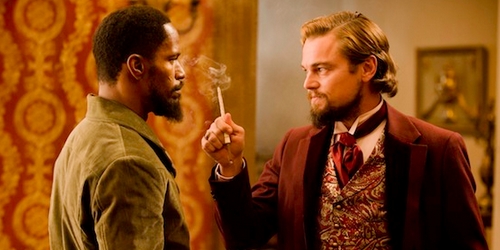
If there’s one fault to be found, it’s that the film is overlong and meanders at times. Not surprising as Tarantino does like to take his time with scenes. There’s a soggy bit in the middle between Django’s training and the arrival Calvin Candie’s (Leonardo DiCaprio) Candie Land Ranch that could use trimming. Arguably it helps establish DiCaprio’s character but his later scenes at the Ranch eclipse those earlier moments further proving their redundancy. The film gets through its paces and moves well enough but like some homage to the Old West Tarantino tries to milk every scene and relishing in the authenticity he’s created. But when the long gorgeous takes and spoken chess matches are over, the film suddenly remembers it’s a Quentin Tarantino film and everything goes bat-shit crazy in a heartbeat. Of all the influences on exhibit in this Tarantino picture, that would likely make Sam Peckinpah very proud.
G-S-T RULING:
Tarantino hit his stride with Inglourious Basterds and to date was probably the finest thing he’s ever done. While that was a tough act to follow, Django Unchained is not better per se but just as well crafted. Like Christopher Nolan and Danny Boyle, Tarantino doesn’t make the same move twice which makes comparing any title in his catalog almost impossible. He makes the films he wants to see, makes them the way he wants it and his films are the better for it. Again it helps that he’s had some of history’s best teachers but he Tarantino is one of the best filmmakers currently working. Don’t miss this one!
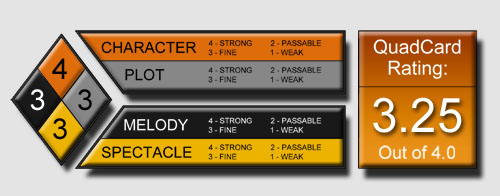
G-S-Talking Point: Tarantino channels the directors he admires when working on certain films. Django Unchained works fine on its own merits but if you’re a little rusty on your Westerns, it might help your enjoyment of Django a little bit more if you’re familiar with the likes of Sam Peckinpah and Terence Hill (check out our list of some titles to start with). But for those of you up to snuff with a working knowledge of Westerns, can you spot the films or directors whose influences were on display here?
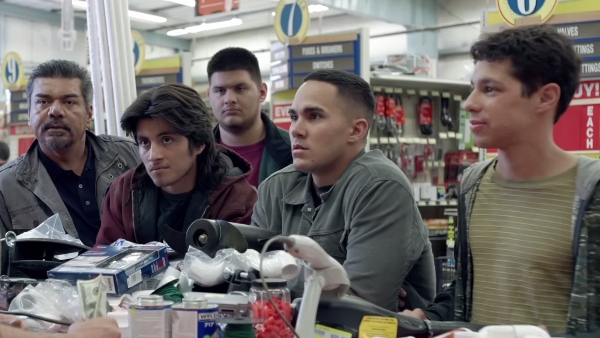
2 Comments
ruth
Hi Marc! I’m not exactly a huge QT fan, but I did appreciate Inglourious Basterds. Not sure I’ll enjoy this one, probably a rental just for Christoph Waltz!
RidgeRacer4
Waltz nearly outdoes himself and channels that brilliant that made Basterds so much fun to watch. It’s definitely still worth a look even if you aren’t too keen on QT. That said, the runtime is the only thing that I think is holding this film from being even better and exceptional. Happy New Year Ruth!